Jordan...Before It's Too Late - By Zaki Bani Rsheid, Middle East Monitor
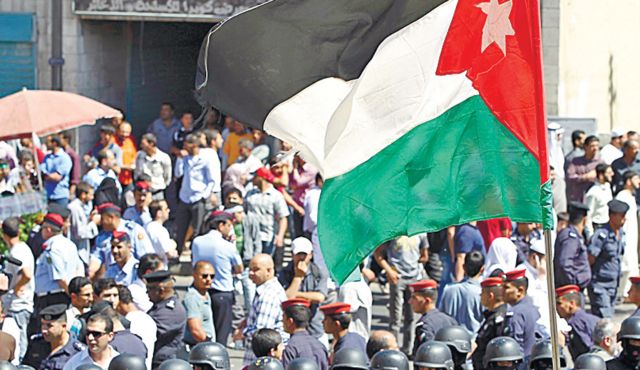
'...there is a political environment that imposed itself on everyone, and did not get anyone's permission to enter the national Jordanian heart'
Perhaps the Jordanian regime believed it had escaped from the bottleneck and survived the reform process that has swept the Arab region acting as an inevitable fate that can only be escaped by restructuring the political administration. This also dictates official recognition of the presence and participation of the people's will in formulating the present and creating the future.
This theory has not been acknowledged by the decision-makers in Jordan after the requirements of the Jordanian–American agreement signed in April were upheld and received the blessings of the U.S. administration. This administration is affected by the trends of the Zionist lobby "AIPAC" for the Jordanian transitional steps marked by the convening of parliamentary elections in early 2013 and changing the political scene, as well as re-producing and recycling characters from previous stages.
The King usually changes the prime minister, who does not rule, but implements the policies of the ruler. The current government is the 100th government, and the heads of intelligence, national security, and the gendarmerie (Darak) are continuously being changed, as though the problem were the people rather than the policies. These are just manoeuvres that cannot solve the problem if the reforms do not reach their objective of setting the foundations for true change which provide a correlation between power and responsibility and restore power to the people, who are essentially the source of authority and legitimacy.
Early this year, the King made a proposal in the media of a several initiatives that include reformatory trends and intentions, as well as promises to exercise democratic transformation and the formulation of a parliamentary majority government. Moreover, he promised the start of peaceful circulation of power, and the most recent of such promises was made last week under the title Democratic Empowerment. The regime and its decision-makers believed that they were able to absorb the people's escalating anger and regain confidence in state institutions. They also believed that the regime was qualified to complete its functional role in structuring the economy and responding to the conditions of the IMF, as well as raising the process of energy and electricity bills.
It is no longer a secret that the players and influential individuals succeeded in utilising the Syrian phobia and its hazardous outputs, and skilfully managed to frighten the Jordanian people with a shift of the violence and chaos to Jordan. This explains the people's idle state and their relative weakness in interacting with the national reform movements. This superficial perception has caused the regime to make the same mistake as the regimes struck by the year of change, when they lost sensation, made in realising the crisis and failing to take initiative in finding a solution before it was too late. The phrase repeated by the former or overthrown leaders was "I now understand."
The question now remains, can this diagnosis establish a state of relaxation and contentment for a regime sitting on a hot plate in a sweltering summer surrounded by a fiery ring while no party can predict or judge its outcome or results?
While ignoring the regional factor that is firmly putting pressure on the aspect of influence, the prestige of the government and its security agencies has declined on a local level after the sever struggle between the Jordanian state's power sources became apparent. This was manifested in the extreme contradictions and violent conflicts between parliamentary members who are the echo of such forces under the dome that transformed into a wrestling ring, reaching the point of making insults, throwing water bottles, physical fighting and drawing weapons.
Therefore, there is a political environment that imposed itself on everyone, and did not get anyone's permission to enter the national Jordanian heart. It created a new reformist culture never seen in Jordan before, and based on this, the re-distribution and balance amongst authorities has become a new national anthem sung by everyone. Moreover, the calls for amending the constitutional articles pertaining to changing the approach to governance have become the most prominent and essential demand. This after the game of replacing individuals with others who were the reason behind the crisis, and a part of the corruption, was no longer fun and nothing but an expression of the misery and inability to perceive the new variable accompanying all processes of social and political transformation.
In recent months, Jordan's experience has been unprecedented which has raised the ceiling of demands and criticisms, reaching the regime itself as being responsible for all that has happened. Up until this point, no real changes have been made to the approach to governance, but instead, touch-ups have been made to the regime's image in a reality that gives the image of change.
With every step it takes, the Jordanian regime is leading itself to a political impasse, which can be noticed in the following manifestations. These can be referred to as the "levers of reform in Jordan".
First: A declining confidence in the throne
This is due to the withdrawal from the contract based on the foundations of the establishment of a Jordanian state, most importantly the status of the ruling family and their lineage, as the "neo-liberal" identity has been given to the Jordanian state and has been linked to the secular and left-wing currents. These now aspire and propose an alliance with the regime to confront the political presence of moderate Islamist movements, which the King referred to as the "Muslim Brotherhood Crescent."
This new identity, which conflicts with the values of lineage and the culture of society, coincides with the accumulation of continuous withdrawal of credit on which the regime was founded. Jordan was established and developed on a contract that guarantees parliamentary monarchy rule, and ended up with an absolute monarchy and personal immunity that is beyond the constitution and that has diminished the role and status of the parliamentary committee that is now unable to carry out its constitutional duties of monitoring and legislation.
The draft laws proposed and formulated by the legislative power and the committee's amendments to laws are subject to the will of the second committee appointed by the King and the results of legislation are dependent on the King's signature. Moreover, the King has the authority to dissolve the committee, as well as call for its convention, suspension or even the delay of its elections. This means that the regime is walking on one foot.
As a result, the state's patriarchal role has declined after reaching a financial and economic crisis due to the corruption and mismanagement. Moreover, it has failed to meet the demands of social and community circles, which explains why some have gone from absolute loyalty to fierce opposition
The official administration was keen during the last decades to bring its supporters closer through its security channels, as well as striking its opposition and feeding the horizontal division in the community. This dangerous conflict has become clear lately, which has led to the inability or failure to contain the phenomenon of social violence that has moved from the streets to universities and the parliament.
Not to mention the financial and economic ventures that exhausted the budget, widened the gap between members of society, and neglected the parties partaking in the growth process. This caused the citizens to feel as if the regime abandoned them in favor of a group of influential individuals surrounding the King, who continue to argue over the privileges and benefits afforded to them, which further aggravates the people.
Perhaps the considerations relating to the historical and social legitimacy of the system and its failure to shed blood is what dictated the demands of the main popular forces for the reformation of the system. They did not repeat the slogans used in other countries, but is this a fixed format; is it able to set the rhythm of the masses? Or will it reproduce the surprises that occurred in the changing Arab countries? This is yet another question to answer.
Second: The debate of identities and demographic configurations
The relations between the components of the public have gone through periods of hidden conflict due to the regime's policies, which benefited from this reality by consolidating its rule by guiding all of the components into trends favored by the regime. This resulted in "Wadi Arabah", which followed the earlier disengagement decision in order for relations to enter a new realm titled "Jordan First".
The purpose of proposing this content and of the agreement with the representatives of the Palestinian people was to reveal the Palestinian conflict and to refute Jordan's requirement to protect the national rights of the Palestinian refugees in Jordan. Moreover, it aimed to abandon legal and moral responsibility for the cause, considering it an internal Palestinian matter that concerned the PLO or Palestinian Authority, "which contributed to the thwarting of the first Intifada" and paved the way for the "Oslo Accords" and then "Wadi Arabah".
Therefore, we witnessed Jordanian-Palestinian competition in making concessions to the Zionist entity, which resulted in the majority of Palestinians in Jordan supporting the Islamic movement. They consider it the conscience that expresses dedication to the historical rights of the Palestinian people, and at the same time preserves Jordanian interests and privacy.
With the emergence of the Arab Spring and the failure of the settlement process with the Zionist enemy, along with the threats made by the enemy to establish an alternative homeland in Jordan, state officials tried to raise concerns over relations between societal groups. However, their attempts failed due to the rationality and responsibility of the opposition in confronting this danger.
It became apparent that the fears of the societal groups began to gradually fade, and the definition of nationalism and identity became clear in the hearts of the public, represented on the ground and accepted by most of the circles demanding reform. We have seen this in the actions of the municipalities, and the ability of the intellectual and political elite to express these meanings and utilise them in managing the conflict with the Zionist project.
Third: Prominence of the economic factor
The economic crisis stemming from the failure of the policies governing the state widened the gap between the government and the public. Moreover, the cases of corruption have become the spark on the streets from time to time, as Jordan suffers from a rapidly growing debt and a clear decline in the balance of trade in a country where over 50 per cent of the budget relies on the outside. This includes transfers from Jordanian expatriates and foreign aid (from the US and the Gulf).
The regime's failure to achieve an economic approach with national agendas rescuing the country from its deteriorating economic state and the corruption cases that have reached the regime itself, especially after the continuation of corruption and providing care and immunity to its icons instead of holding them accountable, has greatly contributed to the increased concern over the integrity of the regime and its desire for reform amid the decline of citizen salaries due to inflation.
Fourth: The movement of tribes
The state built its relations with groups, particularly tribes, on the basis of appointing them to civil jobs and providing them with social, educational and health benefits. However, the increase of their population, the change in lifestyle, the emergence of corruption and the state's failure to bring about justice and balance, as well as the state's focus on developing Amman and the raised rates of unemployment contributed to aggravating the public against the regime that has failed to contain the crises, especially in its dealing with the youth, whose positions only grew stronger in response to security measures taken against them.
The increase in demands from tribes, who have started coordinating their efforts, is the foundation of a new phase in the history of the Jordanian popular movement to achieve the desired political reform.
Fifth: Limiting the infiltration of the intelligence agency
The intelligence agency has always been considered the regime's striking force against its opponents. Even the Jordanians have realized that the formation- sometimes even the implementation- of local policies is done under the supervision of the agency. It controls the state's security, legislative and education branches, as well as the judiciary. Moreover, the agency has fallen into the habit of pitting the people against each other, exceeding its constitutional powers by dominating public life, directly and indirectly forging the results of elections, and finally, supporting the phenomenon of thugs attacking youth movements.
All this has contributed to the fall its domination of security, to the extent that many have criticized it and called for its dissolution or restructuring, as well as limiting its authority and duties to preserving Jordan's national security and facing foreign threats and dangers. There are now calls for it to be prevented from intervening in the state's political and civil branches.
Sixth: The power of the Islamists
The regime realises the power of the Islamists and their influence on the public. This always drives the regime to take them into consideration before taking any steps, and it uses their strong influence to scare off the parties demanding reform by threatening the infiltration of Islamists into the scene in the event reform or elections are made.
On the other hand, the Islamist movements seem more balanced and organised in their performance with the Jordanian public than the political regime. Its position against and boycott of parliamentary and municipal elections, which serves the purpose of reform, is prevalent, despite the tempting offers reaching the point of political seduction. However, its openness to national and tribal leaders and the enthusiasm of the youth towards it is a clear expression of its approach that seeks to influence the scene without monopolising its authority.
The initiative of democratic empowerment launched by the King a few days ago and the changes he made lately do not suggest the presence of a true intention of reform as, at the same time as this, the government blocked hundreds of websites and the development in Ma'an, which has reached the point of declaring a state of civil disorder after the bloody incidents that included the death of several civilians on the grounds who were wanted on security or criminal charges. Are these paths enough to persuade the people of the state's law and institutions and democratic empowerment? Combating corruption? This is a hard task for the regime.
In a time full of change, the constitutional amendments made recently cannot, in any way, meet the demands for reform because it did not make change that is enough to bring about democratic transformation, let alone empowerment. Moreover, the King's privileges in appointing, dissolving, and firing have not been changed. This in itself is a setback for any reformatory efforts, as the people are demanding the distribution of authority rather than one individual monopolising it.
In conclusion, the question that awaits an answer is: Is resorting to the American cover, relying on ambitious and fooling predictions, and giving into the state of calmness or the relative immobility of the public enough for the continuation of the official stubbornness and ignoring the national demands?
On the assumption that the regime is outside the range of danger and that it has a comfortable amount of stability, isn't it in its interest to increase the amount of stability and look for warm national laps to continue to survive? Can't it balance between the unguranteeable foreign support and internal support, which is longer-lasting? Aren't the successful political experiences close to us an example we can learn from, not clone?
Isn't the approach in Morocco, which is similar in many ways, a suitable example for us? Shouldn't we examine the Turkish experience, which provided its people with what many great countries have failed to? However, it was forced to apologise and negotiate with political opponents. These are questions floating in the Jordanian air, but is there a response? It must be done before it is too late.
* The author is the deputy leader of the Muslim Brotherhood in Jordan.
Latest News
-
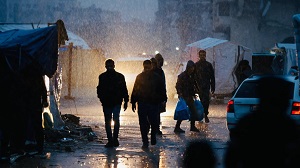 US, Qatar, Turkey, Egypt meet in Miami to discuss Gaza truce on Friday
US, Qatar, Turkey, Egypt meet in Miami to discuss Gaza truce on Friday
-
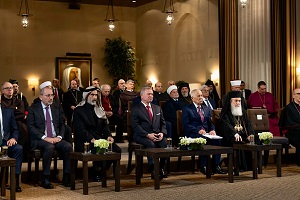 King receives Christian, Muslim religious leaders from Jerusalem, Jordan ahead of Christmas
King receives Christian, Muslim religious leaders from Jerusalem, Jordan ahead of Christmas
-
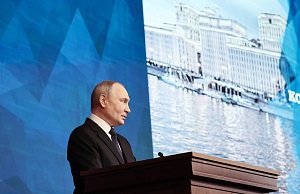 Putin says Russia will 'certainly' achieve its goals in Ukraine
Putin says Russia will 'certainly' achieve its goals in Ukraine
-
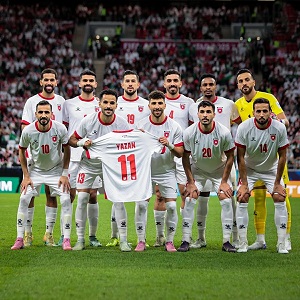 Sellami: Jordan target Arab Cup glory against ‘strong’ Moroccan side
Sellami: Jordan target Arab Cup glory against ‘strong’ Moroccan side
-
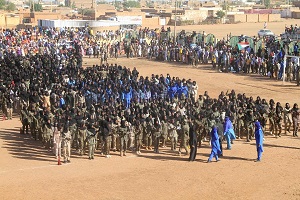 RSF destroying evidence of atrocities in Sudan - report
RSF destroying evidence of atrocities in Sudan - report